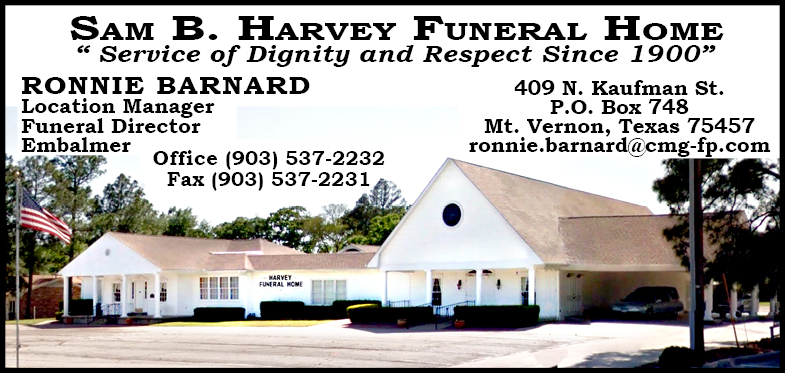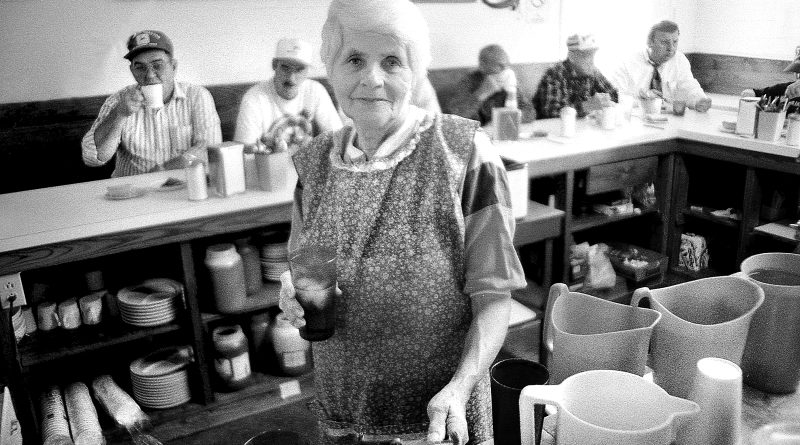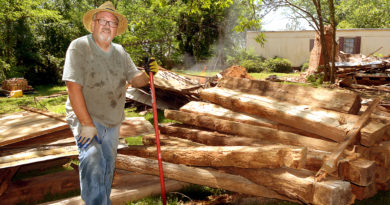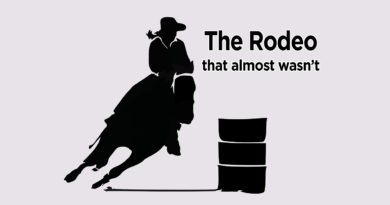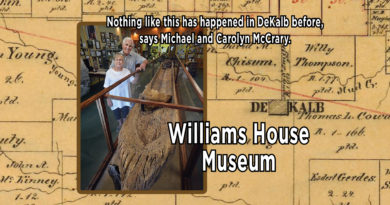Polish teen survives Nazi labor camp
From East Texas Journal, April 1996
By Hudson Old, Journal publisher
A Polish girl who survived the Holocaust concentration camps, Sophie washed dishes at the Winnsboro sale barn.
She knew what it meant when she saw the German soldier standing there with the man from her village who could speak both Polish and German.
She doesn’t remember if she stopped or slowed her pace. There is no mention of tears.
There would be no heroes, only the will of the soldier.
On the way to Russia, Germany invaded Poland September 1, 1939. The Polish cavalry charged German tanks while the Luftwaffe bombed Warsaw into submission. Poland surrendered in days.
She’d seen the bodies left after the planes came and bombed the town where the railroad had its local depot. The Germans were already there, standing back with their guns as the gentle people of Poland’s hills looked and saw and understood.
“These people,” Sofie said of the bodies that she recalled at the depot, “they were not soldiers. There was not this need…” and the thought trails away.
The Germans had come before the harvest, and they took what they wanted from the harvest, leaving the Poles what they wanted the Poles to have that winter.
“We ate frozen potatoes,” Sofie remembered.
It was worse for the Jews, and even worse for any Pole who helped a Jew. The pogrom had begun.
“There was a man starving in the street and a German soldier saw another man offer him milk. He made the Jew take off his clothes, there in the street, and made the other man pour the milk over him, then lick the milk off man and street.”
The Jewish man, wife and child she knew — “Sometimes she would invite me to come and play with the baby and give me something to eat. They disappeared.”
Whatever humiliation the Germans wished upon the Poles, whatever fate they wished to impose became reality. There was no choice.
She was the oldest child of the family at 14. That autumn, Sofie brought the cattle in from the fields, down the paths between the gardens and to her fate, where the German waited with the village translator.
“He told me to come to the train at a certain time the next morning,” she said, and said again, “there was no choice.”
The last thing her mother did for her was give her a sandwich. It was enough food to start a riot. She hid it carefully before she got on the train.
In her memory, time is measured in occupations during the months before she was taken from Poland. First there was the German Blitzkrieg, which lasted only a few days.
There were planes, bombs, and then German troops. Then the Russians came, and the Germans left for a while. (Germans and Russians were allies early in the war. That changed.)
“The Russians were worse,” she said. “They made our boys kill the priests; they taught them this.”
The Germans returned and took a census, and without being told, the people began to understand. She was not surprised the day the Germans came for her.
She remembers her village as something like the Ozarks — not big mountains, but mountains she said.
There was no running water, no electricity, no Santa Claus.
“Who is this?” she laughed at the thought of Christmas in a red suit.
“Sometimes I need to talk to someone to understand,” she said, and broke the thought off with an explanation of her lack of formal schooling.
“I went to school and learned my ABCs,” she said, “then, you know, I walked the cows to the hills beyond the fields each day.”
It was her job to keep the cows out of the fields.
The men plowed the fields with big draft horses. They planted potatoes and sugar beets and wheat. They planted cabbage and carrots in spring, following them with crops of peas.
And Christmas?
“All the people from the villages light candles and walk to the next village — a parade, you know? And the villages all came to town to the church, and it’s different — you’ve been to Europe?” she asked, then continues: “The church is the most beautiful of things to life with the people.”
And food. There was always food at Christmas.
“Everyone always had food at Christmas,” she said. “In every house because if someone doesn’t have food then you give it to him.”
And there was Mayday, another parade through the villages.
In summers they could walk over the mountain to the village of her mother’s family.
Her father’s family came from the land where she lived. He died when she was six, but her mother kept on with the help of her uncles, the brothers of her father, whose fields were on either side of his.
Sometimes they raised a hog for meat, or to sell to buy shoes.
“There is no money, but it’s okay,” she remembered, and these were among the people the Germans conquered when they came.
The train was the beginning of the terror that slowly became the pain, fear and hunger that meant she was still alive.
At first, when she loaded on the train, there were people she recognized from her village or the next, and they rode for several days.
“You’ve seen Schindler’s List? A big building, concrete fence, they unload us. There were just floors. I was left with different people, thousands. I didn’t know anybody. You rent Schindler’s, you will understand better, we were all standing naked so hungry, so weak, no water.”
They came into Germany, she said, at the time of the wheat harvest.
“At one place we stopped and there was water and we ran from the train for water, but they shot them, and we went back.”
After a couple of days, she found herself as close as she’d been to alone.
“The room was small, just a few people and the one guard,” and the thought of her mother’s sandwich, still wrapped in a scarf, clamped under her arm, beneath her shirt.
” I take it out, a little mouse, you know, trying to nibble at it still inside my shirt so nobody sees and takes it.”
She got busted.
The guard came with his bayonet, “and I am so scared he is going to kill me,” but he only takes the food on his bayonet.
“He grinds it away beneath his boot and I watch.”
The first meal she remembers was a large kettle of soup. No spoons, bowls or cups were given, so the people could only scoop up the liquid in their cupped hands.
” I see what is in there,” she said, “and it is so terrible I cannot eat, only take a little to wet my lips.”
My sale-barn lunch was cold, still sitting on the counter. Sofie’s dishes were stacking up, and she kept gently trying to wrap up her story, but I kept asking another question until taking a cue from the lady in charge of the lunch counter.
“It’s slowing up, Sofie,” the bossette said, “one of us can get the dishes”
Whether or not there’s joy in being a dishwasher at a noisy lunch counter full of cowboys in a crowded room is a matter of perspective.
